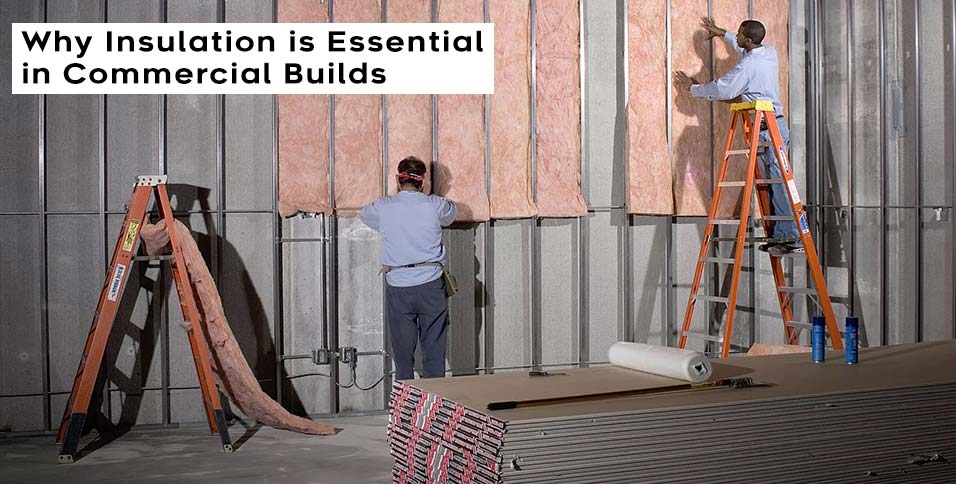If you’re planning to construct a commercial building, one of the most important considerations is insulation. Insulation is essential for maintaining a comfortable indoor environment, reducing energy consumption, and lowering utility bills. Without proper insulation, your commercial building could be subject to extreme temperature fluctuations, moisture buildup, and poor air quality.
Insulation is crucial for commercial buildings because it helps to keep the interior temperature stable and comfortable. In addition, it can help to reduce noise pollution and improve the overall energy efficiency of the building. By reducing heat loss and gain through walls, floors, and roofs, insulation can significantly lower your heating and cooling costs, making it a smart investment for any commercial property owner.
Whether you’re constructing a new building or renovating an existing one, it’s important to make sure that you have adequate insulation in place to ensure optimal comfort and energy efficiency.
Fundamentals of Insulation in Commercial Construction
Insulation is an essential component of any commercial building. Provided by trusted suppliers, such as Australian Insulation Solutions, this product maintains a comfortable indoor temperature, improves energy efficiency, and reduces noise pollution.
There are several factors to consider when selecting insulation for your commercial building.
Firstly, you need to determine the R-value of the insulation you need. R-value is a measure of the insulation’s ability to resist heat transfer. The higher the R-value, the more effective the insulation will be at reducing heat transfer. The R-value required will depend on the climate in your area and the type of building you have.
Secondly, you need to consider the type of insulation material. There are several types of insulation available, including fiberglass, cellulose, spray foam, and rigid foam. Each type has its own advantages and disadvantages, so it’s important to choose the right one for your building’s needs.
Thirdly, you need to ensure that the insulation is installed correctly. Proper installation is crucial to ensure that the insulation performs effectively. It’s important to hire a professional insulation contractor who has experience with commercial buildings.
Finally, you need to consider the cost of insulation. While it may be tempting to choose the cheapest option, it’s important to remember that investing in high-quality insulation will save you money in the long run by reducing energy costs.
Energy Efficiency and Cost Savings
Thermal Performance
Insulation is a key factor in improving the thermal performance of your commercial building. By reducing heat transfer through walls, ceilings, and floors, insulation helps to maintain a consistent temperature inside the building, reducing the workload on your HVAC system.
This not only improves the comfort of your occupants but also reduces energy consumption and operating costs.
Insulation materials such as fiberglass, cellulose, and spray foam have high R-values, which measure their ability to resist heat flow. The higher the R-value, the better the insulation’s thermal performance.
By choosing the right insulation material and thickness, you can achieve the desired level of thermal resistance for your building’s climate zone and energy code requirements.
Operational Cost Reduction
Insulation not only improves thermal performance but also helps to reduce operational costs. By reducing the workload on your HVAC system, insulation can help to extend the life of your equipment, reducing maintenance and replacement costs.
Additionally, insulation can help to reduce the risk of moisture damage and mold growth, which can be costly to remediate.
In addition to these direct cost savings, insulation can also help to improve the resale value of your building. By demonstrating a commitment to energy efficiency and sustainability, you can attract eco-conscious tenants and investors who are willing to pay a premium for a high-performing building.
Building Comfort and Productivity
Insulation is an essential component in commercial builds, and it plays a significant role in creating a comfortable and productive environment for employees. Here are three ways insulation contributes to building comfort and productivity.
Temperature Regulation
Insulation helps regulate the temperature inside a building by preventing heat transfer through walls, roofs, and floors. This means that during hot summer months, the inside of the building stays cool and comfortable, and during cold winter months, the inside stays warm and cozy.
Proper temperature regulation not only keeps employees comfortable, but it also helps maintain productivity levels by reducing distractions caused by discomfort.
Acoustic Control
Insulation also helps control the acoustics inside a building by reducing noise levels. This is especially important in commercial buildings where there may be a lot of foot traffic or machinery noise.
Insulation can absorb sound waves and prevent them from bouncing around, reducing overall noise levels and creating a more peaceful and productive environment.
Indoor Air Quality
Insulation can also improve indoor air quality by preventing the infiltration of pollutants, allergens, and other harmful substances. This is particularly important in commercial buildings where many people are working in close proximity.
Insulation helps create a barrier between the inside and outside of the building, preventing outdoor pollutants from entering and keeping indoor air clean and healthy.
Compliance with Building Codes and Standards
When it comes to commercial builds, complying with building codes and standards is crucial.
Insulation plays a significant role in meeting these requirements. It helps to regulate temperature, reduce noise, and improve energy efficiency, which are all important factors in complying with building codes.
Insulation is essential to meet the requirements of building codes and standards. It helps to prevent heat loss and gain, which is crucial in meeting energy efficiency requirements. Insulation also helps to reduce noise levels, which is important in meeting noise pollution standards.
When it comes to fire safety, insulation can play a critical role. It can help to slow down the spread of fire, which is crucial in meeting fire safety standards. Insulation can also help to prevent the spread of smoke, which can be deadly in the event of a fire.
















